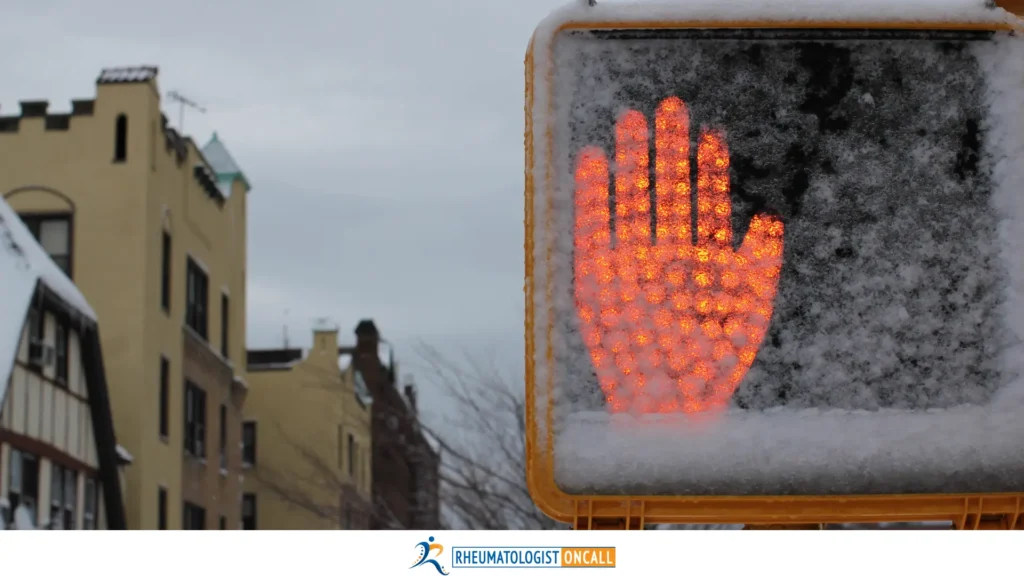SHARE
Imagine this: A snowstorm has hit, the roads are impassable, and you’re stuck indoors. To make matters worse, your Rheumatoid arthritis (RA) flares up, leaving you in pain and struggling to move. What can you do when you can’t access your doctor or refill your medications in time?
In this article, I’ll share essential emergency tips to help rheumatoid arthritis (RA) patients navigate this exact scenario. From natural pain relief hacks to managing inflammation with what you have in the house, these practical strategies can keep you going through even the toughest winter emergencies.
Tip #1: Reduce Pain and Inflammation Naturally
When you’re snowed in and unable to access your usual treatments, managing pain and stiffness becomes your top priority. Thankfully, there are natural ways to reduce discomfort using simple items you likely already have at home.
What You Can Do
- Apply Heat: To relax stiff joints, use a hot water bottle, heating pad, or a towel warmed in the microwave (test the temperature carefully!).
- Try Cold Therapy: For severe swelling, wrap ice cubes or frozen vegetables in a cloth and apply for 10–15 minutes. Alternating heat and cold can enhance relief.
- Hydrate Your Joints: Stay hydrated by drinking warm water or herbal teas to keep your joints lubricated.
By using heat or cold therapy, you can ease joint stiffness and manage your pain naturally while waiting out the storm.
Tip #2: Use Emergency Anti-Inflammatory Foods
Food is medicine. Yes, the food you eat directly affects your inflammation levels. While sugary snacks may be tempting, they can worsen inflammation. Instead, focus on anti-inflammatory options to keep your RA flare under control.
What You Can Do
- Make Ginger Tea: Slice fresh ginger, steep it in hot water, and add some lemon juice. Ginger has natural anti-inflammatory properties and can help soothe pain.
- Enjoy Turmeric Milk: Mix half a teaspoon of turmeric into warm milk or a plant-based alternative. Add a pinch of black pepper to enhance turmeric absorption.
- Prepare Oatmeal: A warm bowl of oatmeal provides energy and fiber. Sprinkle cinnamon for an added anti-inflammatory boost.
These simple, warming foods can help reduce inflammation and improve how you feel, even during a snowstorm.
Tip #3: Keep Your Joints Moving
Staying active is crucial to prevent stiffness and maintain joint flexibility even when you’re stuck indoors. Gentle exercises can make a big difference without putting too much strain on your body.
What You Can Do
- Hand Stretches: Open and close your hands into fists, then stretch your fingers wide. Repeat slowly.
- Seated Leg Lifts: Sit on a chair, straighten one leg, hold it for a few seconds, then lower it. Switch to the other leg.
- Neck and Shoulder Rolls: Gently roll your neck and shoulders to ease upper-body tension.
Remember, small, regular movements can prevent stiffness and help you feel more comfortable while waiting for conditions to improve.
Tip #4: Manage Stress and Relax Your Body
Stress can worsen RA symptoms, and being snowed in can add to your anxiety. Taking steps to calm your mind and body can reduce flare-ups and help you regain a sense of control.
What You Can Do
- Practice Square Breathing: Inhale for 4 seconds, hold for 4 seconds, exhale for 4 seconds, and repeat for 2–5 minutes.
- Try Progressive Muscle Relaxation: Tense and relax each muscle group, starting with your feet and working upward.
- Distract Yourself: Listen to calming music, watch a favorite movie, or dive into a good book to shift your focus away from pain.
By managing stress, you can minimize its impact on your RA and make the situation feel more manageable.
Tip #5: Plan Ahead for Medication Shortages
Running out of medications during a snowstorm can be a frightening prospect. Being prepared can help you avoid this scenario and ensure you have what you need to manage your RA.
What You Can Do
- Stock Up: Keep a small reserve of your RA medications, such as NSAIDs (naproxen, ibuprofen) or steroids like prednisone. Talk to your doctor about creating a backup plan.
- Consider OTC Options: Ask your doctor about over-the-counter pain relievers that could temporarily help.
- Leverage Telemedicine: Use telemedicine services to connect with a rheumatologist without leaving your home. At Rheumatologist OnCall, we provide care across the U.S., saving you from dangerous trips on icy roads.
Planning ahead ensures you’re prepared for emergencies and can handle flare-ups effectively.
You’re Stronger Than You Think
Being stuck in the snow is challenging for anyone, but with these tips, you can take control of your RA and minimize discomfort. Focus on small steps—warming up your joints, making a healthy drink, or calming your mind. Remember: You have the strength to manage your RA, even in the toughest conditions. Stay safe, stay warm, and take care of yourself!














